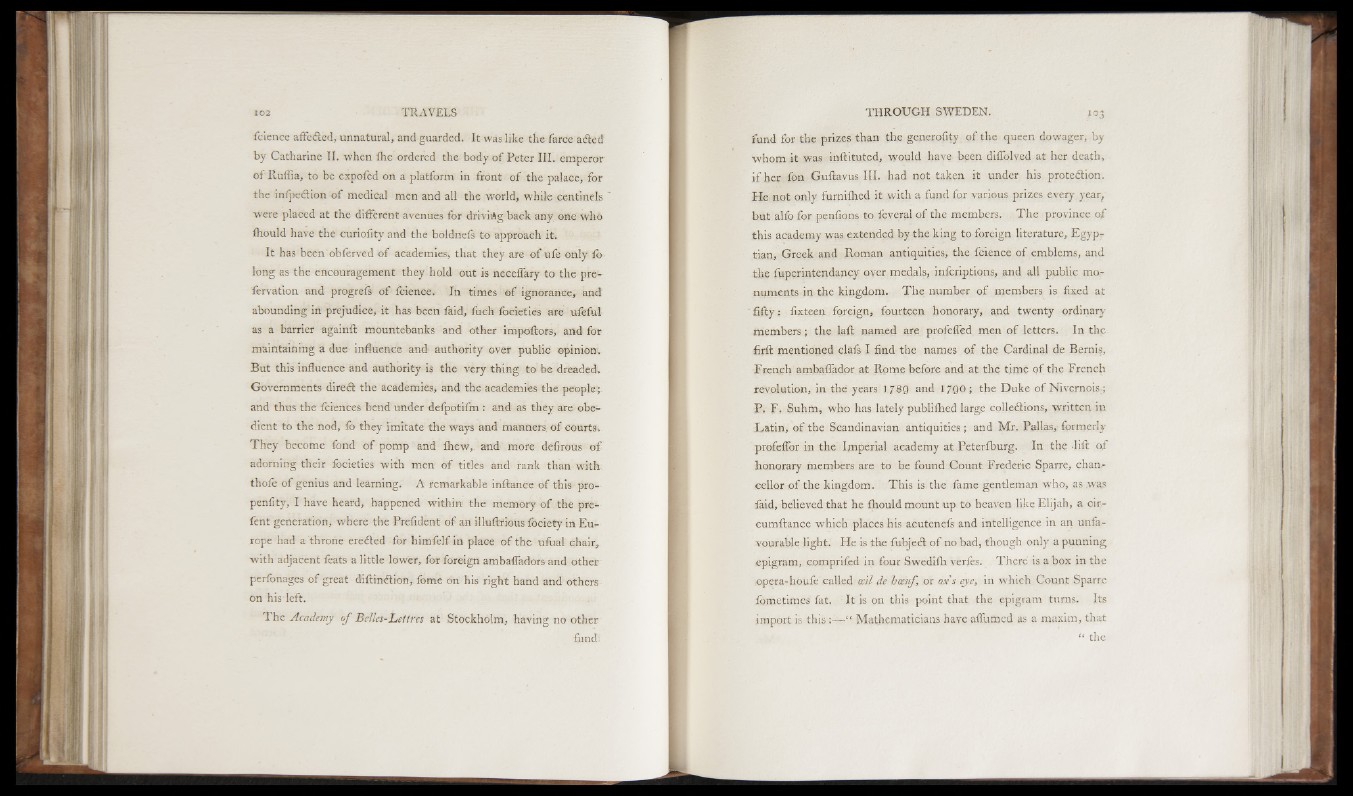
fcience affe&ed, unnatural, and guarded. It was like the farce a ¿ted
by Catharine II. when Ihe ordered the body o f Peter III. emperor
o f Ruffia, to be expofed on a platform in front o f the palace, for
the infpedion o f medical men and all the world, while centinels
were placed at the different avenues for driving back any one who
fhould have the curiofity and the boldnefs to approach it.
It has been'obierved o f academies, that they are o f ufe only fb
long as the encouragement they hold out is neceflary to the pre-
forvation and progrefs o f fcience. In times o f ignorance, and
abounding in prejudice, it has been faid, foch focieties are ufeful
as a barrier againil mountebanks and other impoftots, arid for
maintaining a due influence and authority over public opinion.
But this influence and authority is the very thing to be dreaded.
Governments dired the academies, and the academies the people;,
and thus the fciences bend under defpotifm : and as they are obedient
to the nod, fo they imitate the ways and manners, o f courts.
They become fond o f pomp and Ihew, and more defirous o f
adorning their focieties with men o f titles and rank than with
thofe o f genius and learning. A remarkable in fiance o f this pro-
penfity, I have heard, happened within the memory o f the pre-
fent generation, where the Prefident o f an illuftrious fociety in Europe
had a throne ereded for himfelf in place o f the uiual chair,
with adjacent feats a little lower, for foreign ambafladors and other
perfonages o f great diftindion, fome on his right hand and others
on his left.
The Academy o f Belles-Lettres at Stockholm, having no other
fund;
fund for the prizes than the generofity o f the queen dowager, by
whom it was inftituted, would have been diiTolved at her death,
i f her fon Guftavus III. had not taken it under his protedion.
He not only furnifhed it with a fund for various prizes every year,
but alfo for penfions to fevered o f the members. T h e province of
this academy was extended by the king to foreign literature, Egyptian,
Greek and Roman antiquities, the fcience o f emblems, and
the fuperintendancy over medals, infcriptions, and all public monuments
in the kingdom. T he number o f members is fixed at
fifty; fixteen foreign, fourteen honorary, and twenty ordinary
members; the laft named are profefled men o f letters. In the
firft mentioned clafs I find the names o f the Cardinal de Bernis,
French ambaffador at Rome before and at the time o f the French
revolution, in the' years 1 ?89 and 1790 ; the Duke o f Nivernois.;
P, F, Suhm, who has lately publiihed large colledions, written in
Latin, o f the Scandinavian antiquities; and Mr. Pallas,- formerly
profeffor in the Imperial academy at Peteriburg. In the lift o f
honorary members are to be found Count Frederic Sparre, chancellor
o f the kingdom. This is the fame gentleman who, as was
faid, believed that he ihould mount up to heaven like Elijah, a oir-
cumftance which places his acutenels and intelligence in an unfavourable
light. He is the fubject o f no bad, though only a punning
epigram, eomprifed in four Swediih verfes. There is a box in the
opera- lioufe called ostl de hceuf, or ox's eye, in which Count Sparre
fometimes fat, It is on this point that the epigram turns. Its
import is this :— “ Mathematicians have affirmed as a maxim, that
“ the